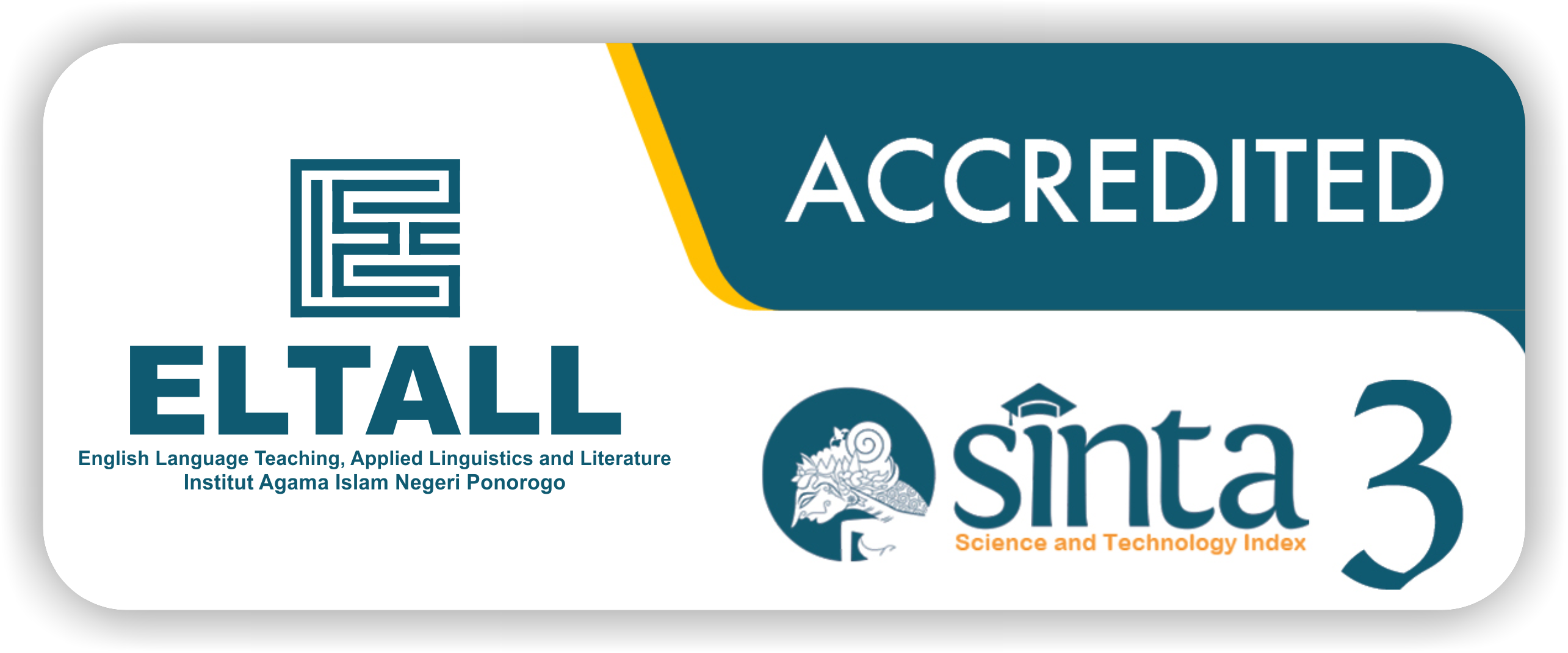English Language Teaching in Islamic Boarding School: Navigating the Digital Revolution
DOI:
https://doi.org/10.21154/eltall.v6i1.10827Keywords:
Digital Era, Islamic Boarding School, English Language TeachingAbstract
Teaching English in Islamic boarding schools or traditional Islamic educational institutions in Indonesia faces significant challenges due to technological developments. In recent years, technology has changed how people learn, communicate, and interact. This study aims to investigate how English teachers teach English in the digital era when Islamic boarding school regulations prohibit students from bringing gadgets. Qualitative study was used in this study by using interview and observations as data collection technique. The findings of this study revealed that the educational pattern at pesantren fulfilled the characteristics of a modern pesantren with formal and informal education system. English teachers do not refuse the existence of technology but do not use it as the primary method of learning in the classroom. The learning method is still based on teacher-centered and lecture-based learning methods. Some challenges in teaching English are traditional learning methods, monotonous classroom atmosphere, lack of teacher competence, and lack of teaching sources. The conclusion emphasizes the need for teacher training, improved teaching methods, and teaching sources.
References
Arif, Muhamad, Ari Kartiko, Ibnu Rusydi, M. Afif Zamroni, and Moch Sya’Roni Hasan. 2024. “The Existence of Madrasah Ibtidaiyah Based on Pesantren: Challenges and Opportunities in The Digital Era.” Munaddhomah 5(4):367–82. doi: 10.31538/munaddhomah.v5i4.1401.
Darwis, Mohammad. n.d. REVITALISASI PERAN PESANTREN DI ERA 4.0.
Dwi Andriani, Zulfi Zumala. 2024. “Adjustment and Adaptation: English Curriculum Development in Pesantren.” Englisia: Journal of Language, Education, and Humanities 11(2):249. doi: 10.22373/ej.v11i2.19862.
Dwisetyo Nurhartoto, Vici, Maria Arina Luardini, and Indra Perdana. 2022. “THE PROBLEMATIC ENGLISH TEACHING LEARNING IN GRADE VII JUNIOR HIGH PONDOK PESANTREN AL-MARHAMAH PUTRA.” Journal Compound 10(2):85–92. doi: 10.37304/jcp.v10i2.8648.
Kurniawan, M. Agus, and Ema Puspitasari. 2025. “METAMORFOSIS SANTRI DIGITAL: TRANSFORMASI PEMBELAJARAN KITAB KUNING MELALUI PODCAST INTERAKTIF DI PESANTREN MODERN.” Indonesian Society and Religion Research 2(2):116–27. doi: https://ccg-edu.org/index.php/isah.
Madkur, Ahmad, Muhammad Syihab As’ad, Agus Prayogo, Aisyah Sunarwan, Syahreni Siregar, Trisna Dinillah Harya, and Dedi Irwansyah. 2024. “Context-Responsive Pedagogy in English Language Teaching in Indonesian Islamic Boarding Schools.” Journal of Education and Learning 18(3):626–38. doi: 10.11591/edulearn.v18i3.21085.
Muiz, Abdul. 2023. “Pesantren in the Digital Era: Looking for the Chances and the Challenges.” At-Tarbawi: Jurnal Kajian Kependidikan Islam 8(1):31–46. doi: 10.22515/attarbawi.v8i1.6246.
Nair, Viknesh, and Melor Md Yunus. 2021. “A Systematic Review of Digital Storytelling in Improving Speaking Skills.” Sustainability (Switzerland) 13(17).
Nikmatullah, Cecep, Wawan Wahyudin, Naf’an Tarihoran, and Anis Fauzi. 2023. “Digital Pesantren: Revitalization of the Islamic Education System in the Disruptive Era.” Al-Izzah: Jurnal Hasil-Hasil Penelitian 1. doi: 10.31332/ai.v0i0.5880.
Nisa, Durotun, Siti Aimah, and Fathiyah Mohd Fakhruddin. 2024. “PESANTREN TRANSFORMATION IN THE DIGITAL ERA: SOLUTION OR THREAT FOR ISLAMIC EDUCATION.” Leadership: Jurnal Mahasiswa Manajemen Pendidikan Islam 5(2):247–60. doi: 10.32478/leadership.v5i2.2712.
Rahayu. 2020. “AN ANALYSIS OF ENGLISH LANGUAGE LEARNING TOWARD ENTREPRENEURSHIP EDUCATION FOR SANTRI IN PONDOK PESANTREN SLEMAN YOGYAKARTA.” INOVISH JOURNAL 5(1):32–43.
Ridwan Maulana Rifqi Muzakky, Rijaal Mahmuudy, and Andhita Risko Faristiana. 2023. “TRANSFORMASI PESANTREN MENGHADAPI ERA REVOLUSI DIGITAL 4.0.” ALADALAH: Jurnal Politik, Sosial, Hukum Dan Humaniora 1(3):241–55. doi: 10.59246/aladalah.v1i3.371.
Setiorini, Risqi, Siti Aimah, and Fatiyah Mohd Fakhruddin. 2024. “Leadership: Jurnal Mahasiswa Manajemen Pendidikan Islam TRANSFORMATION OF PESANTREN ORGANIZATIONAL CULTURE: STRATEGIES FOR PESANTREN TO BECOME CENTERS OF INNOVATION IN THE DIGITAL ERA.” doi: 10.32478/leadership.v6i1.2879.
Sholihah, Nanda, Apri Wardana Ritonga, and Ayu Desrani. 2025. “Environmental and Institutional Support: A Study of English Language Education in Pesantren Settings.” Journal of English Language Teaching and Literature (JELITA) 6(1):2721–1916.
Umar, Muallief, Galuh Kartikasari Stai, Miftahul Ula, and Nglawak Kertosono. 2025. The Transformation of Islamic Education: Pesantren, Digital Literacy, and the Practice of Harmonious Religious Moderation. Vol. 8.
Wicaksono, Eko, Mohamad Ali, and Mahasri Shobahiya. 2024. Educational Pattern of Islamic Boarding Schools in the Contemporary Era (Case Study: Al-Mukmin Ngruki Islamic Boarding School). Surakarta. doi: 10.2991/978-2-38476-102-9_53.
Yusuf, Mochamad Irfan, Agus Maimun, Basri, and Muhammad As’ad. 2024. “Transformational Leadership of KH. Yusuf Hasyim in Preserving Traditional Islamic Education at Pesantren Tebuireng.” Munaddhomah 5(4):383–94. doi: 10.31538/munaddhomah.v5i4.1430.
Downloads
Published
Issue
Section
License
Copyright (c) 2025 ELTALL: English Language Teaching, Applied Linguistic and Literature

This work is licensed under a Creative Commons Attribution-NonCommercial 4.0 International License.
All articles published in ELTALL (English Language Teaching, Applied Linguistics, and Literature Journal) are licensed under the Creative Commons Attribution-NonCommercial 4.0 International License (CC BY-NC 4.0).
Under this license, authors and readers are free to:
- Share. copy and redistribute the material in any medium or format
- Adapt. remix, transform, and build upon the material
Under the following terms:
- Attribution. You must give appropriate credit, provide a link to the license, and indicate if changes were made. You may do so in any reasonable manner but not in any way that suggests the licensor endorses you or your use.
- Non-Commercial. You may not use the material for commercial purposes.
Notices:
- The licensor cannot revoke these freedoms as long as you follow the license terms.
- No additional restrictions. You may not apply legal terms or technological measures that legally restrict others from doing anything the license permits.
For the full legal code of the license, please visit: https://creativecommons.org/licenses/by-nc/4.0/













